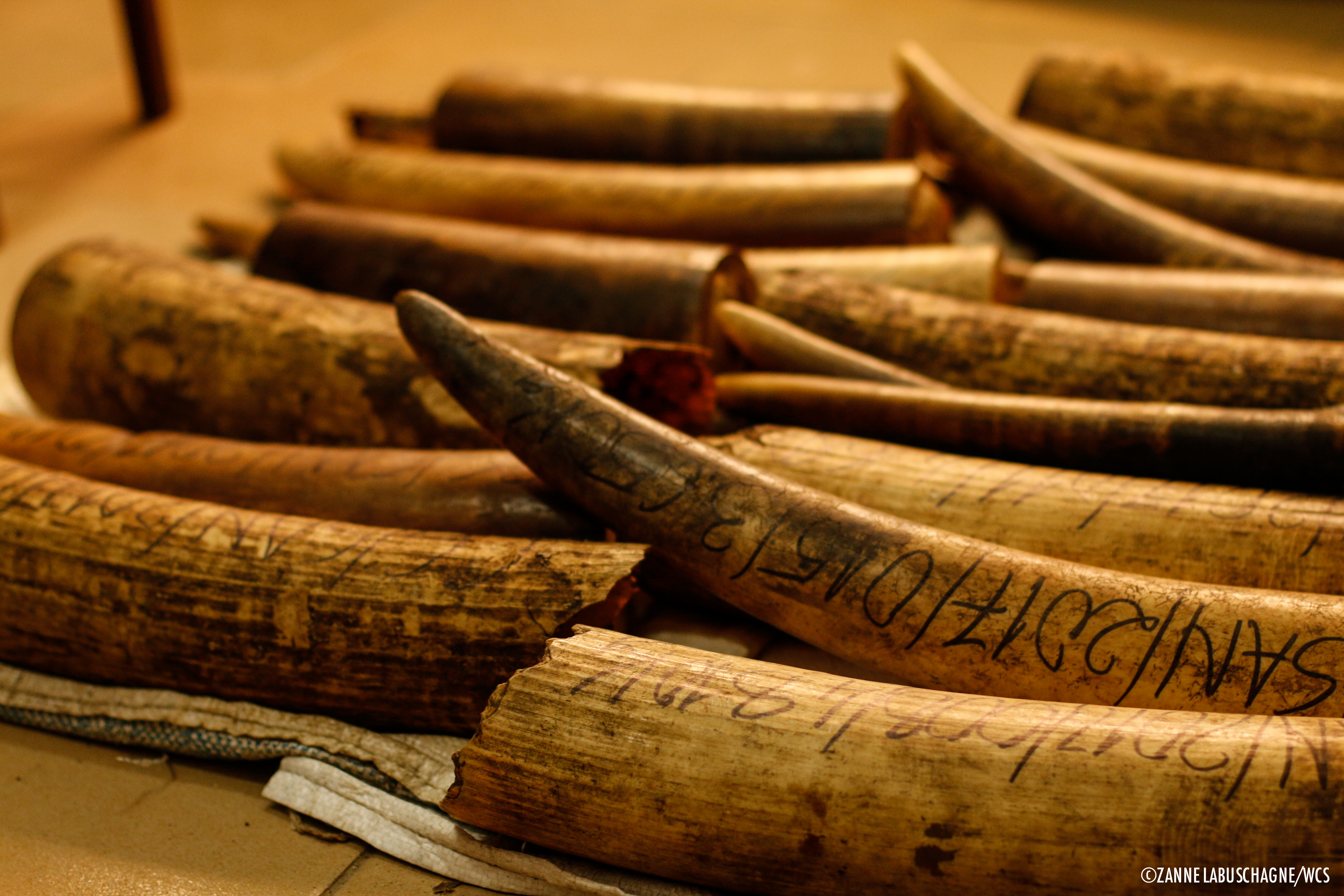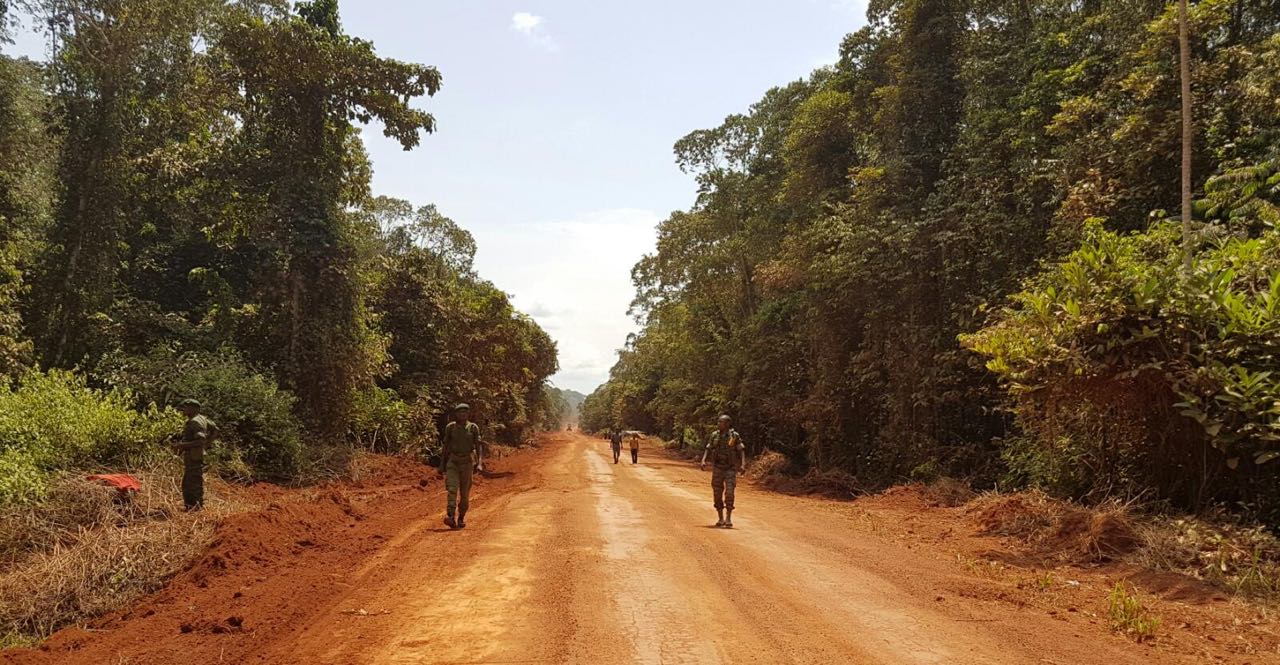
Major Ivory trafficker jailed
Northern Congo’s notorious elephant poacher and ivory trafficker Daring Dissaka, 39, has been convicted with a five-year sentence. Connected to international ivory networks, Dissaka’s imprisonment represents another significant step forwards for the Republic of Congo’s justice system and forest elephant conservation in Central Africa.
A group of investigators and legal experts, who make up the Wildlife Crime Unit (WCU) employed by the Nouabale-Ndoki National Park to follow up wildlife crime cases in and around the Park, have been tracking Dissaka’s whereabouts closely since September 2016. After a string of successful operations, the ‘Daring’ network was finally identified and infiltrated. Later in January 2017, a WCU-informed police raid seized 70kg of ivory in the northern logging town of Pokola. One member of the ‘Daring’ network was arrested at the scene, who promptly cited Dissaka as the owner of the ivory.
”Since its conception, WCU investigations have directly led to 17 major convictions, 9 of which are for the longest serving sentence for wildlife crime in the Republic of Congo (5 years).
With evidence stacking against Dissaka, the State Prosecutor for the District of Sangha issued a warrant for his arrest, and the manhunt began. Clearly aware of his precarious position Dissaka maintained a low profile. In early May, WCU investigators finally located Dissaka’s hideout in the District Capital of Ouesso, and coordinated his arrest with the local police and the Ministry of Forestry Economy and Sustainable Development (MEFDD) on the 17th May 2017. Swiftly, two days later, Daring Dissaka was tried and convicted with the maximum sentence possible for wildlife crime (5 years) and a major fine.
However, this is not Dissaka’s first jail sentence. As early as 2005, Dissaka started hunting elephants for ivory in Northern Congo, and has since built links to major international ivory dealers. In 2011, a PALF (Projet d’appui à l’Application de la Loi sur la Faune) investigation led to the conviction of a Chadian ivory trafficker arrested by rangers working on the periphery of Nouabale-Ndoki National Park – a buyer of Dissaka’s ivory. Subsequent investigations led to his Dissaka’s arrest in 2011 and then later in 2013. Both times, he served incomplete jail sentences, but upon release his return to old habits was immediate.

Launched in February 2016, the Wildlife Crime Unit operates within the periphery of the Nouabalé-Ndoki National Park supporting the Park’s ranger team in researching illegal activities. The WCU’s ‘Suivi Juridique’ branch consists of dedicated Congolese lawyers who follow up on wildlife crime cases at the courts and prisons in northern Congo’s two large district capitals Ouesso and Impfondo. Since its conception, WCU investigations have directly led to 17 major convictions, 9 of which are for the longest serving sentence for wildlife crime in the Republic of Congo (5 years).
Currently, the WCU is working with the Congolese authorities hoping to transfer Dissaka to a prison further south. With his strong connections in the north, his chances of evasion, or continued involvement in poaching and trafficking activities (even from the confines of prison) are much higher. Through a strategic prison transfer, ongoing monitoring, and providing follow-up visits and prisoner council, it is hoped the path to recidivism for Dissaka is blocked once and for all.
The Nouabale-Ndoki National Park, spanning 4,200 square kilometres of pristine lowland rainforest, is managed by the Nouabale-Ndoki Foundation, a public private partnership between the Congolese Government and the Wildlife Conservation Society (WCS) Congo Program. Operating under the Nouabale-Ndoki Foundation, the Wildlife Crime Unit works to bring wildlife criminals to justice in the urban centers of northern Congo with support from USAID’s Central Africa Regional Program for the Environment (CARPE), the Elephant Crisis Fund, The Wildcat Foundation, and the U.S. Fish and Wildlife Service.


Lorenzo Temelini
Obviously he has not changed
Once released he goes right back to slaughtering elephants
For the repeated offensives and no remorse only pure greed he should be jailed for a much longer jail time
Let him rot in jail as he has done to the many elephants he has massacred
Montgomery doiel
Way to go, WCU.
Keep up the good work.